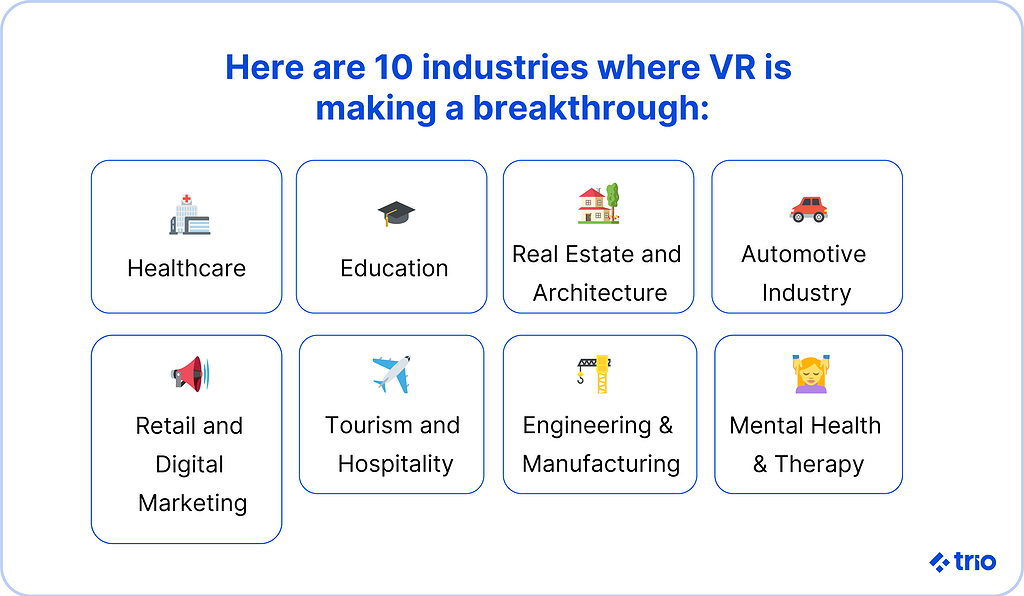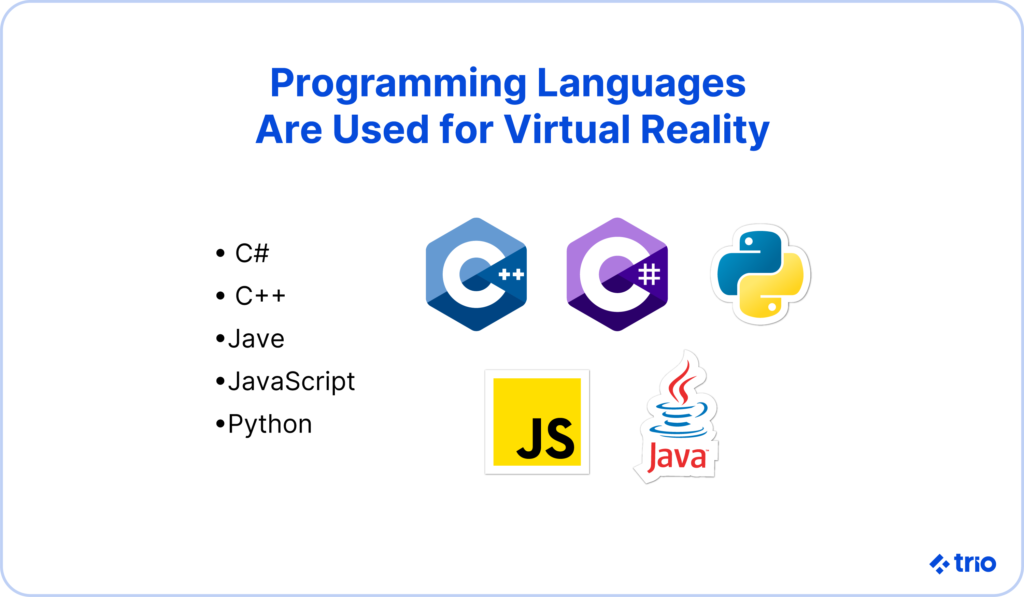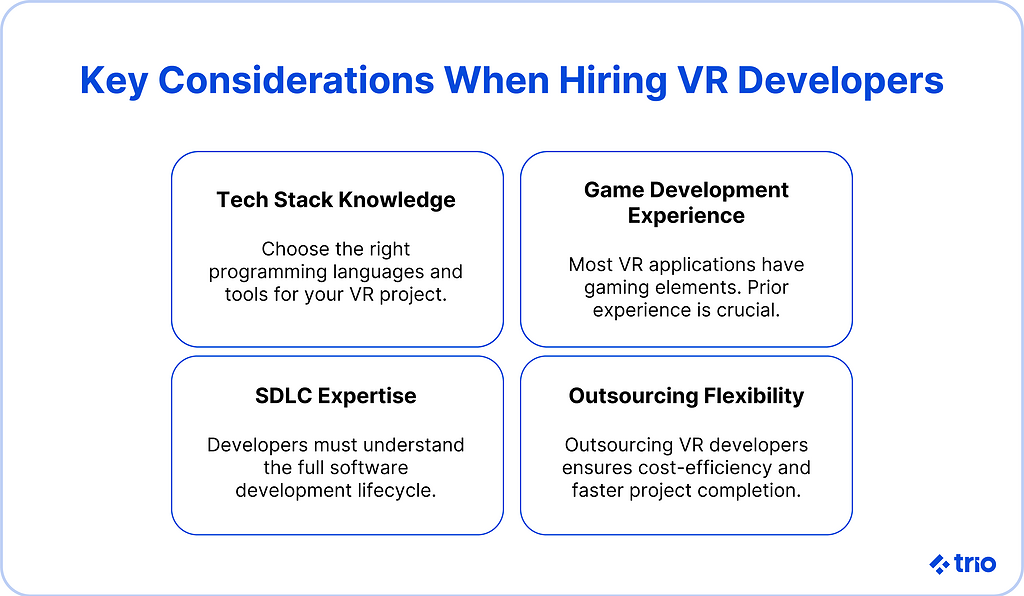Virtual reality (VR) is no longer just science fiction. It’s part of your present-day reality, and its applications are expanding rapidly across multiple industries beyond gaming.
Many industries – from healthcare and education to real estate, retail, and even mental health therapy -have already had a taste of the new technology and are enjoying the benefits that it provides.
VR offers a controlled environment for mimicking real-life scenarios with little to no risk for the person in it.
Businesses and professionals are leveraging VR to enhance training, improve customer experiences, and revolutionize product development. As technology advances, its impact continues to grow, reshaping the way we interact, work, and learn.
To learn more about the primary uses of virtual realities and how you could benefit from making use of VR applications, stay tuned.
Here at Trio, we have the best developers in the market and provide only the finest insights from the world of technology. Many of those developers have years of experience in VR applications and can help you create your visions through cost-effective development.
Are you ready to start your development project?
We have the developers you need to take your development project in the right direction.
Companies are proven to grow their business faster with Trio.
Quick Overview
- Healthcare – VR enhances surgical training, pain management, mental health therapy, and medical simulations in risk-free environments.
- Education – Virtual classrooms, immersive training, and interactive lessons improve learning in schools, universities, and corporate settings.
- Real Estate & Architecture – VR-powered tours let buyers explore properties remotely while architects visualize and refine designs before construction.
- Automotive Industry – Car manufacturers use VR for design, crash simulations, virtual test drives, and autonomous vehicle development.
- Retail & Digital Marketing – Brands leverage VR for virtual shopping, interactive product trials, and immersive advertising campaigns.
- Tourism & Hospitality – Virtual tours allow travelers to preview destinations, hotels, and cultural sites before booking trips.
- Engineering & Manufacturing – VR helps prototype testing, assembly line optimization, and worker training in complex or hazardous environments.
- Mental Health & Therapy – VR exposure therapy treats PTSD, anxiety, phobias, and stress relief through immersive relaxation experiences.
- Sports Training – Athletes and coaches analyze performance, refine strategies, and simulate real-game scenarios using VR.
- Social Interaction & Remote Work – Virtual platforms support remote collaboration, networking, business meetings, and online communities.
- Entertainment & Media – VR transforms gaming, filmmaking, live concerts, and theme park attractions into highly immersive experiences.
- Military & Defense – VR is used for combat training, mission simulations, PTSD rehabilitation, and strategic planning.
- Law Enforcement & Forensics – Police train for crisis response, forensic analysts reconstruct crime scenes, and courtrooms explore VR evidence.
- Occupational Safety & Risk Management – VR-based simulations improve workplace safety training in construction, mining, and emergency response.
- Space Exploration & Astronomy – NASA and researchers use VR for astronaut training, planetary exploration, and space mission simulations.
15 Virtual Reality Applications
The exact history of virtual reality is unknown, but it’s been a topic of conversation for centuries. However, it is only recently that technology has emerged to transform fantasy into reality.
Here are 10 industries where VR is making a breakthrough:

1. Healthcare
The most important way VR is modernizing healthcare is through training. VR facilitates an environment in which to learn and grow outside in real-world situations.
With VR, specialists who need to perform very precise operations can practice without being in the midst of an emergency. And practitioners who need to get familiar with the hospital environment can do so without the extra stress involved.
This was particularly useful during the pandemic when doctors were using VR to learn how to do basic tasks while wearing protective gear.
The technology is also being used in pain management, physical rehabilitation, and cognitive behavior therapy, where patients with phobias and anxieties work through their problems in a controlled environment.
VR is now assisting in remote consultations, allowing doctors to diagnose and treat patients in virtual clinics. It’s also being explored for dementia care, helping patients recall memories through immersive experiences.
2. Education
Even though education is believed to be a rather slow industry in picking up new trends and technologies, VR has already shown a lot of promise.
For adults, it means that any industry can provide professional training to their employees. However, for younger students, VR is part of educational games, field trips, and, in general, experiencing the world.
VR is also widely used in higher education for immersive science experiments, medical simulations, and even virtual reality history lessons that allow students to “visit” historical events.
3. Real Estate and Architecture
Using VR, architects can not only envision what they’re building but understand how it feels as well. This allows them to experience the space before it is built and make real-time changes to deliver customer satisfaction.
For real estate, VR-powered virtual tours let potential buyers explore properties remotely, helping investors and homebuyers make informed decisions. Real estate agents also use VR staging to digitally furnish empty properties, enhancing marketing efforts.
4. Automotive Industry
VR helps car manufacturers in analyzing road scenarios and the behavior of cars. The simulated situations allow them to analyze and make changes to the prototypes before developing a new model.
Virtual reality is widely used in the development of smart cars that will flood the market in the future. Cars learn how to drive, turn, and stop using artificial intelligence (AR) and VR-based road simulations.
VR also plays a key role in training drivers, with virtual driving simulations improving road safety awareness.
5. Retail and Digital Marketing
While most people don’t like commercials, experiencing the use of a product close-up can actually be an entertaining and enlightening experience. There are a variety of VR applications in digital marketing.
For example, retailers can show potential customers how a product will look in their home.
Brands are now using VR to create virtual storefronts where customers can shop in fully immersive environments. Luxury retailers are integrating VR fashion shows, allowing users to experience runway events from anywhere in the world.
6. Tourism and Hospitality
Try a holiday before you buy it. No, seriously. One pointed virtual reality application is tourism.
You can go on guided virtual tours of hotels, landmarks, restaurants, and whatever else you may want to visit on your next vacation. And then when you do go, you know you won’t be disappointed.
VR also enhances accessibility, allowing those unable to travel due to physical or financial limitations to experience world-famous sites. Hotels and resorts now use VR to showcase their amenities, helping guests make informed booking decisions.
7. Engineering & Manufacturing
VR is widely used in engineering and manufacturing to design, prototype, and test products before they go into production.
Virtual simulations allow manufacturers to identify design flaws early, reducing costs and improving efficiency. VR-based factory training helps workers safely learn how to operate complex machinery before stepping onto the production floor.
8. Mental Health & Therapy
Much of this industry relies on VR so that a patient can embody someone else and imagine reality from a different perspective or worldview. Immersive environments can leave positive impacts on future social interactions.
VR exposure therapy is now commonly used to treat PTSD, anxiety disorders, and even depression by placing patients in controlled environments that help them face their fears gradually. Meditation and mindfulness VR applications provide stress relief through guided relaxation techniques in immersive virtual settings.
9. Sports Training
Athletes use VR for real-time game strategy analysis, performance tracking, and skill improvement by simulating real-life match situations.
Coaches and teams integrate VR to visualize plays, analyze opponents’ movements, and refine tactics without physical exertion. This is particularly useful in high-impact sports where excessive practice can increase injury risk.
10. Social Interaction & Remote Work
VR is transforming social interactions, allowing people to communicate in virtual worlds with avatars, voice, and gesture tracking.
Companies now use VR-powered workspaces for remote meetings, training, and collaboration, making digital workplaces feel more immersive. VR networking events and virtual conferences are gaining popularity, providing a unique way to connect with professionals worldwide.
11. Entertainment & Media
The entertainment industry was one of the first to incorporate VR and still remains one of the strongest examples of how it can be applied.
If you look at online and/or console gaming, you will see that VR has a strong presence in this industry. Similarly, VR is being introduced to cinemas and theme parks to simulate movie-like adventures and let people experience their favorite cinematographic masterpieces.
Live VR concerts and virtual reality filmmaking are redefining audience engagement, allowing users to step inside their favorite stories in unprecedented ways.
12. Military & Defense
Given that these two industries have to operate in rather dangerous environments that can’t be easily accessed, VR provides conditions for making things as close to reality as possible for training.
VR enables trainees to go through preparation with minimal risks and even helps soldiers suffering from battlefield trauma to overcome these conditions and prepare for new or unexpected situations.
VR combat training allows military personnel to practice mission scenarios, urban warfare strategies, and flight simulations in a controlled environment.
13. Law Enforcement & Forensics
Police forces use VR to train for de-escalation tactics, crime scene investigations, and high-risk hostage situations.
Courtrooms are exploring VR reconstructions of crime scenes to help jurors visualize events more accurately.
14. Occupational Safety & Risk Management
Occupational safety and health (OSH) is a concern for workplaces with machinery or natural hazards.
These workplace dangers can be addressed in a simulated environment so workers can learn how to respond to them effectively without being hurt. Firefighters, construction workers, and emergency responders use VR for high-risk scenario training, improving reaction times and reducing workplace accidents.
15. Space Exploration & Astronomy
NASA and space agencies use VR for astronaut training, helping them prepare for missions in low-gravity environments. Scientists also utilize VR to analyze cosmic data, explore planetary surfaces, and visualize space in immersive ways.
Advantages of Implementing VR Across Industries
There are many advantages of different VR applications across industries. The main ones include:
- Enhanced user engagement through immersive experiences.
- Cost savings in training and prototyping by simulating real-world scenarios.
- Improved accessibility to services and experiences regardless of location.
- Innovative marketing opportunities through interactive content.
We’ve already covered many of these in the sections above. If you think that you could benefit from implementing VR in your business, read out to us here at Trio. We are experienced in promoting business growth through technology, and our developers are ready to advise you.
What Programming Languages Are Used for Virtual Reality?
When it comes to the intersection of software and hardware that’s involved in making technology like VR, not all programming languages will suffice.
There are only a few specific languages that can get the job done.

C#
C# is a general-purpose, multi-paradigm language. Its most popular usage is as part of the Microsoft .NET framework, which has various development tools. This includes the cross-platform mobile development framework called Xamarin and the game engine Unity.
Unity is especially important for building virtual reality applications as it is a platform for real-time 2D and 3D game development. Of course, extending this use case to VR games would not be a problem.
C++
C++ is an extension of C, a popular middle-level programming language. Middle-level languages, including C++, naturally have the benefit of low-level memory manipulation, making them more viable for working closely with hardware.
For that same reason, the language is used in yet another game engine, Unreal Engine. Unreal Engine markets itself as being the “world’s most open and advanced real-time 3D creation tool…[delivering] immersive virtual worlds.”
Java
Java is a general-purpose, object-oriented programming language with a quarter of a century of years behind it.
The language’s low-level aspects – somewhat mirroring the memory management in languages like C# and C++ – and its large set of built-in libraries make Java a great language for building virtual reality environments.
JavaScript
JavaScript first gained popularity by being one of the very first languages to allow for dynamic web development. Most web browsers rely on JavaScript, making the language suitable for WebXR Device API, a platform enabling VR through your browser.
Python
The first four languages are the prime picks for virtual reality development. But Python deserves an honorary mention. Python is pretty straightforward and will speed up development projects, especially those using VR.
The language also comes equipped with several packages that can aid in the building of virtual reality applications.
How To Hire a Developer for Virtual Reality Projects
To hire developers for a virtual reality project, you need to know a bit about virtual reality first.
For example, you should have enough input to understand how to choose your tech stack for the project, including which language would work best for development.
You should also look for developers with experience in game development, as many virtual reality applications are in gaming. As with any developer, your job candidates should have deep knowledge of the software development life cycle (SDLC), particularly because VR projects are often high-stakes.
Last but not least, you should consider outsourcing your virtual reality talent. This will leverage your flexibility and nearly guarantee professionalism and the completion of your project. Outsourcing developers has become a popular way of meeting project needs.


Subscribe to learn more about Hiring
Conclusion
Now that you know several ways in which virtual reality can be used, you can think more carefully about which technologies will boost business growth. As VR adoption continues to accelerate, industries that embrace this technology early will gain a competitive edge, enhancing efficiency, customer engagement, and innovation.
Much of this is covered by choosing the right programming language to use in developing VR projects.
Another big part is finding a team of developers who can do the work well. Learning how to hire the right developer can be difficult. Some businesses even choose to outsource abroad as an alternative.
At Trio, we provide expert VR developers who specialize in crafting immersive experiences tailored to your industry’s needs. From virtual training solutions to interactive marketing campaigns, our developers bring cutting-edge technology to your business.
We’re your AI advantage! Experience the AI revolution with our expert AI Developers and OpenAI Developers. Boost efficiency, make data-driven decisions, and captivate your customers with personalized experiences. Don’t wait; explore our AI Developers and OpenAI Developers services now for a transformative business journey!
If you’re still unsure, don’t be afraid to reach out to Trio for a free consultation. We provide developers who care about seeing your project from start to finish.






